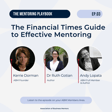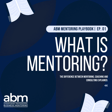Become a Creator today!Start creating today - Share your story with the world!
Start for free
00:00:00
00:00:01

Guided Reflection or Supervision?
Podcast Summary: ABM Mentoring Playbook – Guided Reflection or Supervision
This episode of the ABM Mentoring Playbook podcast, hosted by ABM founder Kerrie Dorman, delves into the topic of "Guided Reflection or Supervision." Joining her is Nicki Deeson, an ABM Fellow and certified mentoring supervisor. Nicki brings years of experience as a former global CFO, accredited coach, and supervisor, offering a wealth of expertise in reflective practices and mentoring supervision. Her approach emphasises practical tools for personal and professional development in mentoring relationships.
Key Learnings
- The Value of Supervision: The discussion highlights how guided reflection fosters growth and accountability in mentors, enhancing their ability to support mentees effectively.
- Practical Approaches: Nicki shares methods to incorporate reflective practices into mentoring, ensuring mentors remain resourceful, self-aware, and equipped to manage challenges.
- Key Questions: The episode introduces reflective questions to deepen understanding of mentor-mentee dynamics and improve the outcomes of supervision sessions.
- Importance of Preparation: Preparing for supervision sessions ensures focused and productive reflections, leading to actionable insights.
Listeners can access a questionnaire to prepare for their next supervision session. This tool helps structure reflections, making the sessions more impactful.
Tune in to learn how guided reflection can transform your mentoring practice and elevate professional relationships.
Recommended
Transcript
Introduction to ABM Mentoring Playbook
00:00:01
Speaker
Hi, welcome to the ABM Mentoring Playbook. This is your podcast on all things mentoring, tools, techniques, and best practices. I'm your host, Kerry Dorman. I'm the founder and chief ambassador of the Association of Business Mentors. And every month I'm going to be speaking with an expert guest about a specific tool to help you elevate your mentoring practice. So without further ado, let's crack on to this month's episode.
Importance of Supervision in Mentoring
00:00:32
Speaker
Welcome, Nicky Deason, to this month's version of the Mentoring Playbook. Thanks so much for joining me today. How are you? I am really well, Kerry, and thank you for inviting me. I hope it's going to be useful to everybody listening. Well, it absolutely will be because our chosen topic, which is highly appropriate for you and me to be talking about, is supervision.
00:00:56
Speaker
And so before we go any further, though, can I just ask you to give us a little bit of context in terms of your coaching and mentoring experience, including your supervision qualifications?
Nicky's Coaching and Supervision Journey
00:01:12
Speaker
Sure, yes. um I've been a full-time coach and mentor since 2019. I've had over a thousand hours of experience. And at the very beginning, um somebody said to me, when you are looking for a coach or mentor, never choose somebody who's seen you in your pajamas and always choose somebody who has got a supervisor themself.
00:01:37
Speaker
And so I rushed out straight away and got myself a supervisor, and I've had one ever since. And the supervision has been so valuable for me, that and I've loved it so much that I decided to train as a supervisor myself. um And I qualified as a supervisor ah about a year and a half ago. And um yeah, I love the supervision too.
Learning Differences: Coaching vs. Supervision
00:02:01
Speaker
So tell me what is the difference, whats what's the difference in the learning between a coaching qualification and a supervision qualification?
00:02:14
Speaker
Yeah, that is a really good question, and it took me quite a lot of my superficial qualification to work that out. It's really... There are a couple of differences. um One is that when you're coaching and mentoring, your mentee doesn't always know what mentoring is, and so you're having to guide them through it.
00:02:39
Speaker
um in a way where they're learning what it is as well as going through the process. When you're supervising a mentor, they do know what mentoring is, which means that you can have more of a partnership with them, um and the learning is more shared. So I would say there is a little bit more emphasis or ownership by the supervisee of the supervision process than there is by the mentee of the mentoring process, if that works and makes sense.
Perspectives in Supervision
00:03:13
Speaker
um And the other difference is that as a so in a supervision session you've got many more perspectives.
00:03:21
Speaker
um You've got the how the mentee was presenting in a session, for example, how the mentor was feeling going into that session. What's the relationship like between the mentor and the mentee?
00:03:36
Speaker
um how is how How does the relationship um show itself between those two and what were the interactions in the session? And also, how is the supervision relationship impacting on that? So sometimes when we bring things to supervision, it actually impacts how we are as a mentor, simply bringing it to supervision and going through the dynamics of the supervision session, it can start to replicate things that have happened in the mentoring session. And so it's thinking about all those different perspectives and thinking about that wider system that we all operate in as mentors as well.
Supervision as Guided Reflection
00:04:19
Speaker
So can you, and I think it's a relevant point to ask, can you define supervision?
00:04:30
Speaker
Yes. I would... When I did my qualification, I had to learn this and I've forgotten it, of course. um I would define it as guided reflection with a qualified supervisor on your mentoring, um who you are as a mentor, and how you mentor.
00:04:55
Speaker
And it's all about maximising the impact ah that you're having on your mentoring clients and on society as a whole. And why is it so healthy? i'm um'm I mean, I'm going to talk about my experience in a second with you just to compare notes, really. But I'm keen to understand why it's been positioned as such a healthy activity to do for us as mentors.
Supervision as Investment in Training
00:05:22
Speaker
o When I was working in the corporate sector, we we had £1,000 per employee as a training budget, and people would use that to go on different training courses. um And I think of supervision as a similar thing. So for myself, I'm investing, you know, um a budget each year on maximizing my performance and best serving my clients.
00:05:49
Speaker
And it's all about... it It has three aspects, people say. So there is a formative aspect, which is developmental, so it's about developing our skills. There is a supportive aspect, so sometimes we've had a very difficult session or we've had a difficult interaction with a client, and it's impacted our confidence and and therefore our competence as a mentor.
00:06:16
Speaker
and getting that support really helps to bring back our confidence and our competence. And finally, it's called normative, which means that there is um checking that we are still working to our ethical standards and the the standards that are expected to us as a mentor in terms of the position that we hold with our mentee, um when to refer somebody to counselling, so um other ethical considerations, for example.
00:06:50
Speaker
Yeah, interesting. And Nicky, tell me, so I've got two questions for you as a as ah on the back of that. So firstly, what's the difference do you think between having um a mentor having a mentor and a mentor having a properly guided reflective session with a supervisor?
Mentoring vs. Supervision
00:07:15
Speaker
I think we all know what mentoring is and we know that if we have a mentor, then we will take a topic to that session and they will use mentoring techniques like, for example, the grow model or other other techniques to help us to work out where we want to get to and to help us get there.
00:07:40
Speaker
When we go to into a supervision session with a supervisor, we we take a supervision question and we consider it more from all the different perspectives. So that's that's really the difference, is that it's looking at it from the system's perspective, from your perspective as a mentor, from the supervisor's perspective, from the mentee's perspective.
00:08:10
Speaker
Does that make sense? Yeah, it does, it does. ah Which leads me on to my second question, which is, why do you think there's such a stigma around the word supervision?
Stigma Around Supervision
00:08:23
Speaker
And I just ask that purely because whenever I've been talking to other mentors about supervision, because it's a path that I've recently taken on, drawn down myself,
00:08:36
Speaker
there's this immediate, almost defensive response, and i I think it's the word. What do you think? Can you tell me more about that, the responses? Yeah, well, let's start with me first. So, when when I first started learning about supervision and what it does, i it immediately reminded me of having to be supervised at school a lot because I was so naughty.
00:09:05
Speaker
and the And I guess that made me feel that i needed to the the onus of mentoring supervision was being put on me because it was the immediate perception that I wasn't doing it i wasn't doing it correctly, which may or may not be true, but that's beside the point. However, it just made it just immediately had this negative connotation which ah so put put up a barrier, a natural barrier, which shouldn't be the case at all. and And I can say that now that I've embarked on supervision and mentoring circles. And they are the healthiest thing in the whole wide world. I had a fantastic session yesterday, which I'll tell you about in a bit, but I'm keen to explore this whole perception, this barrier of of the word supervision. So that's my take.
Changing Perceptions of Supervision
00:10:01
Speaker
However, when I've been talking to other mentors, they their response is, well, yeah I'm a ahma professional business mentor. why why do i need Why do I need to be supervised? Yeah, I think i think you're right that the word could definitely have negative connotations.
00:10:25
Speaker
um And for me,
00:10:30
Speaker
I think because I was sort of advised to get it from the very start so that I didn't go through that process. I knew that I was learning and that and I'm still learning and I hope that I'll still be learning on my deathbed um and and supervision But maybe a better word would be guided reflection or ongoing training and development. you know When you are at work in an office, nobody says, oh, you shouldn't go on a training course because you're you're already there. Everybody's learning, everybody's developing, and um supervision is part of that investment in yourself to keep on learning and developing.
00:11:11
Speaker
And maybe a different word ah a better word would be something like guided reflection. What do you think? I definitely think that reflection is the core of a supervision session. I had my second last week, actually, and
00:11:33
Speaker
I think what it brought me, it it made me look at how I was reflecting and making sure that I was reflecting on the right things.
Positive Experiences with Guided Reflection
00:11:42
Speaker
And and I brought a particular piece to the to the session. It was all about
00:11:49
Speaker
my concern about adding value and so we went down this that the whole road of why was I concerned about it and looking at the outcomes for my mentee and just really drilling right down and it I came away feeling quite relieved. It was sort of like a ah li it was a lift off off ah off my shoulder, so to speak, you know, just because I was sharing and exploring with somebody else who was asking me particularly great questions know that I would never ask myself.
00:12:30
Speaker
So, and and that for me was pure reflection, guide guided reflection down a path that I would never probably be able to take myself. And that's what I enjoyed about it. The circles that I was in this ah this week were were great. they were really People really opening up about concerns and as ah in small groups, really lending support and and guidance and lessons learned previously. It was an extremely healthy activity and I completely enjoyed it and it was very, very valuable.
Boosting Confidence and Competence through Supervision
00:13:12
Speaker
Yes. Well, i I have always found the same thing and and what you touched on there, which is about going down a path you wouldn't have gone otherwise. I think we all as mentors, we try to do that post-session reflection after every session and think about ah what went well and what could have been better.
00:13:31
Speaker
having supervision makes me do that. And also, it makes it more impactful because I take the topics to supervision. And for example, um one of the things that I i do is every year I i do a... I take a transcript of a mentoring session to supervision, obviously anonymize.
00:13:55
Speaker
And um one time last year, I went through it and I thought I was terrible in that session. I was not a good mentor. oh I gave them advice here. and I should have asked that question there instead of this one. um And so i I had a list of things. yeah There were a couple of things I thought I'd done well. And there were a lot of things that I thought I should have done better. And when I took it to the supervision session,
00:14:23
Speaker
it was... It was sort of a massive lightbulb moment because I realised it was more about my confidence and my competence and my supervisor having that objective view of the session and pointing out things that I hadn't seen that I'd done well and helping me with the things that I wanted to do better.
00:14:44
Speaker
um i I gave me a massive lift, whereas I think if I hadn't had the supervision, I think I might have started thinking, oh, I'm not good enough. Maybe I shouldn't do this anymore. no Yeah, which is not rare, is it? For mentors to go down that down that route, that good old imposter syndrome. Anyway, ah so see I've got ah another question for you that you mentioned earlier. Why why should supervisors never have seen you in your pyjamas? That's quite a funny thing to say. That was mentors, really. And I think it's if you if you choose a mentor who knows you really well,
00:15:23
Speaker
you know, would would you choose your best friend or your spouse or your sister or your you mom to be to be your mentor? Probably not. I think that was the point, really. and I see. Okay, that makes sense. Actually, that probably comes into play with us because I've i've chosen not to have supervision with you because we're too close, which ah I think is exactly that. that makes And I would like to say to everybody that I haven't seen you in your pajamas. Not yet, anyway.
00:15:53
Speaker
no you No, you haven't, though. Luckily, not many people have.
Finding the Right Supervisor
00:15:58
Speaker
um So, where where does one find an appropriate supervisor, reflected guidance person? where Where do we go? Well, I think if you go onto LinkedIn, you'd probably find lots of them. um It really is about finding the person.
00:16:19
Speaker
that you seem to click with and that you feel you can trust and you feel it's going to be a positive relationship. There are four of us on the ABM website, not not to be biased or anything. So if you go onto the ABM website under supervision, there are four of us and we're all very experienced supervisors and we've got our bios there. You can sign up for free a call, although I would please ask you to choose one person and sign up with them, and then see how that goes. And if you feel that the relationship is good and it's going to be valuable to you, then um
00:17:04
Speaker
Go ahead. Otherwise not look elsewhere and and yeah, that there'll be a supervisor out there that's going to be perfect for you. Yeah. i I agree with that. But also I think from my point of view is that having a mix of the the supervision, the guided reflection sessions and the mentoring circles is a very healthy mixture of lots of yeah ah ah different different reflections.
00:17:34
Speaker
And I'm feeling very mentoring healthy at the moment because of all of that. Excellent. And yes, I completely agree. um there are There are benefits to both of those and there are occasionally slight downsides to both of them as well. So yeah, it's really good to have a mix. Yeah,
Understanding Identity as a Mentor through Supervision
00:17:54
Speaker
brilliant. Well, Nikki, thank you so much for joining me in talking about this.
00:17:58
Speaker
this a highly wonderful, important and healthy topic. um Hopefully we've broken down a few barriers to it today, but I know that you'd be welcome to talk to anybody should they be interested.
00:18:12
Speaker
Absolutely. And I'd like to leave you with a saying that somebody gave me, which is, supervision and the associated reflection, planning for it, and thinking about it afterwards, are where we learn the most about who we are as a mentor. And who we are is how we mentor.
00:18:34
Speaker
Oh, love that. Who said it? I don't know. I didn't write that down. It's on a scrap of paper that I just i picked up this morning and thought, oh, I can use this. Yeah, that's fantastic. Brilliant. Well, that's a wonderful note to finish on. Thank you very much, Nikki. Thank you.
Conclusion and Resources
00:18:51
Speaker
Thank you for listening to this month's ABM Mentoring Playbook. You can find all of our previous episodes in your ABM members area, including some fantastic downloadable resources to further support you on your mentoring journey. Each one accompanies the topic that I've just been talking about. If you have any suggestions or questions for future tools that we should cover, please do get in touch with the ABM team via email. Happy mentoring. Remember to have fun.





